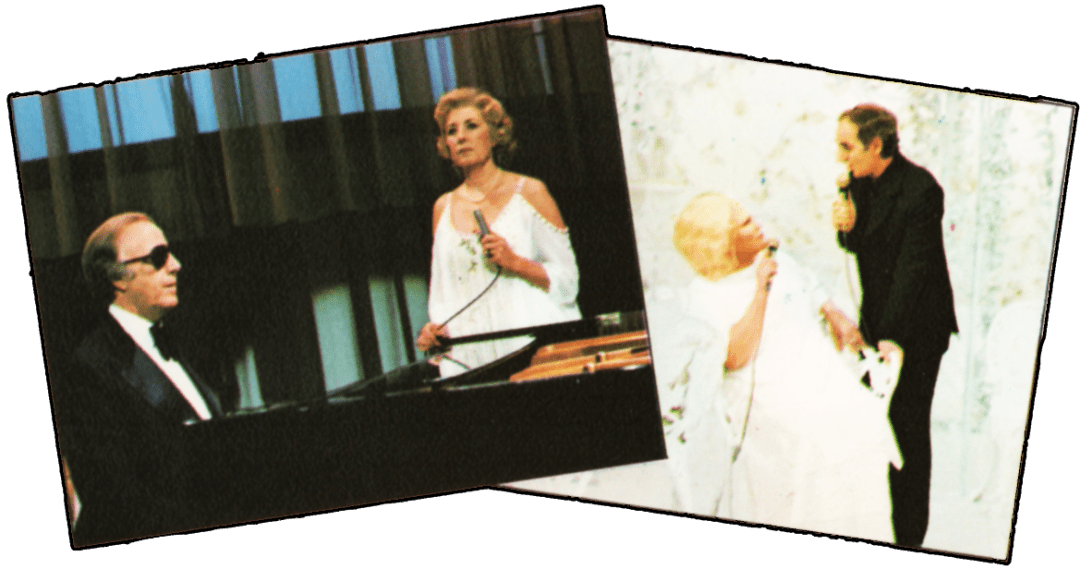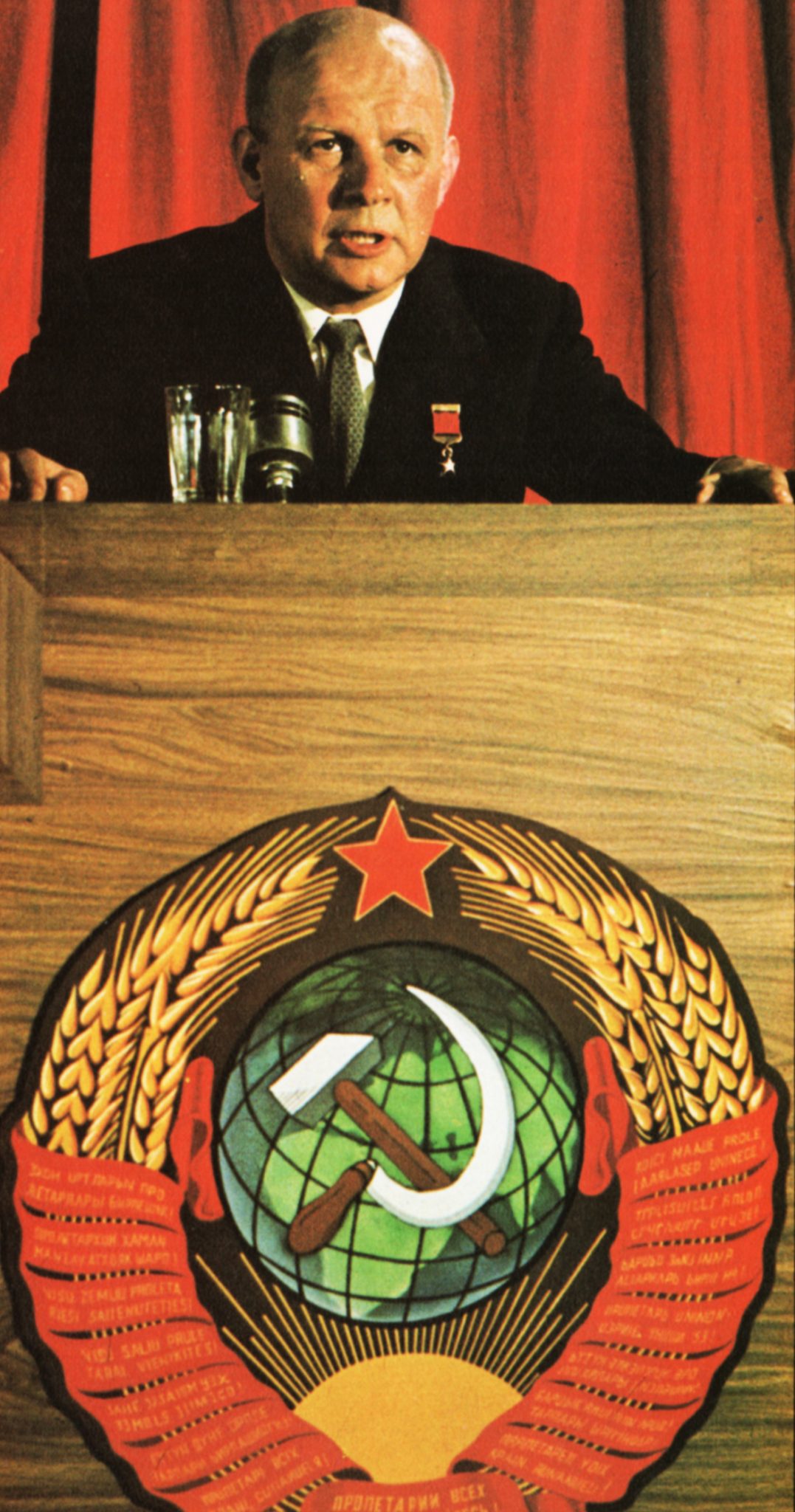Autumn programmes
A review of Thames programmes for the autumn of 1977

The stories of six sports which originated in Britain were told by Wynford Vaughan Thomas in This Sporting Land. Racing, tennis, boxing, rugby, soccer and cricket from past into present were shown through a mix of archive film material, appearances by personalities (Mike Brearley, Sir Leonard Hutton, Wilfrid Hyde White, Fred Perry, Sue Barker, Henry Cooper and Bobby Moore among them), and specially filmed re-enactments of 18th and 19th century matches.
‘In the first “This Sporting Land” Wynford Vaughan Thomas gives a witty, learned and thoroughly enjoyable account of the history and current idiosyncrasies of cricket. It’s a gem of a programme and will beguile even the most fervent disliker of the game’
Sunday Times
‘The narration, by Wynford Vaughan Thomas, is a mixture of acid, irony, mockery and straight reportage. Each programme will certainly hold the attention. They are entertaining, informative and humorous!’
Times Educational Supplement
ON 12 SEPTEMBER THAMES LAUNCHED TWO MAJOR NEW DAILY PROGRAMMES,
THAMES AT 6 AND AFTER NOON
Former ITN newscaster Andrew Gardner introduced Thames at 6, a 6.00pm report on London and its day. The production was structured to bring more hard, regional news coverage, and more deeply probing investigations, to the traditional Today function. Within the first month these aims began to be realised, with interviews with Jim Slater and the Minister for Health, special investigations into the Luton murder and the drug Primados, and on the lighter side, Kenny Everett’s zany music reviews hinted at what is to come when Kenny;s own series starts on Thames during 1978.
‘The word has clearly gone out that no-one is going to be allowed to get away with anything. The brief bursts of questioning are ultra-tough. (The first week has) managed already by turns to illuminate, to irritate and to celebrate’
Times
After Noon was a recasting of its successful predecessor Good Afternoon, broadening the outlook from traditional women’s subjects’ to greater coverage of the arts, politics, education, medicine and social questions, alongside the personality interviews and magazine features.
In its first weeks, After Noon went on location with reports on the Tate Gallery’s ‘Save the Stubbs’ campaign (with an interview with Arts Minister Lord Donaldson), and on life in high rise blocks. Personality interviews included Mary Parkinson with Pierre Cardin, Judith Chalmers with James Herriot, Elaine Grand meeting Lord Shinwell, Mavis Nicholson holding the first-ever TV interview with current pop sensation Elvis Costello, followed shortly by Morecambe and Wise.
Straight into the national ratings in second place, John Alderton’s first situation comedy series for Thames, The Upchat Line, revolved around Mike Upchat, a freewheeling man about town. ‘We don’t know what he does for a living,’ Alderton explained. ‘Sometimes he says he’s a writer but at other times he claims to be anything from a psychologist to a piano tuner.’
‘The Upchat Line, written by Keith Waterhouse and featuring John Alderton, marks something of a welcome and enterprising departure from the old routine. For this is comedy refined down to a quieter, more relaxed level with some nicely polished lines doing the work of the usual mad antics, and a real star performance from one of the best light comedy actors around today. It is all done with great panache and style, with Mr Alderton giving a deceptively easy performance, casually putting together all the little bits of business, and underplaying and drawling his lines but timing everything with split second precision.
Mr Waterhouse has put together a script tailored to suit him to perfection, and also to provide Thames with a fresh and obviously rewarding range of comedy.’
Daily Telegraph
‘Hilarious new comedy series in which John Alderton proves his comic talent as a would-be writer who spends most of his life trying to find somewhere to lay his head – and his birds. Looks very promising (though not for the husbands!).’
Sunday Mirror
After a summer trip to Spain filming inserts for future programmes, Magpie returned with a new presenter to join the team of Jenny Hanley and Mick Robertson: 24-year-old ex-LBC news director Tommy Boyd, selected from 2,000 applicants. Here’s how the London Evening News welcomed the programme back:
‘The most entertaining and informative children’s programme on television is Magpie, on Thames. Jenny Hanley is extremely attractive and has a presence and authority that enthralls the children. The producers go to remarkable lengths and not a little expense in bringing strange and unusual items to the programme, and whether the kiddies realise ft or not, they are being educated as well as entertained. Magpie is an intelligent show, and also has a fine record in obtaining money for children’s charities.’
Evening News
Originally made as a schools programme, Superman and the Bride’s outspoken survey of how we are conditioned by the media (especially television and film) reached the adult audience in October. Its blend of documentary and revue was described as ‘a refreshing TV breakthrough’ by the Daily Mail.
‘Eight years of the average viewer’s life is spent in front of the box. In that time each one should be forced to spend forty-five minutes watching Superman and the Bride for it is the most intelligent and important appraisal yet produced of the images fed to us by the mass media.’
TimeOut
‘As one of the vox pop interviewees said, you’ve got to overstate a case to make it effectively, and this was the jolliest, zippiest overstatement of a case that badly needs making – energetically, and again and again. It could well prompt further pieces of televisual self-scrutiny. It was itself replete with delicious ironies, notably its unabashed use of advertising techniques as a way of attacking advertising techniques, and also its mere presence on our screens – which is living proof that the “system” can be penetrated.’
The Times
A television appearance by Tommy Steele is a rare event, and to celebrate his twenty-first year in showbusiness (Tommy’s first hit, ‘Rock With the Caveman’, coincided with the first year of ITV) he came to Thames for Tommy Steele and a Show. It was a mammoth production, with producer/director Keith Beckett pulling every trick from videotape technology, to interpret the ‘Show’ as devised by Tommy and written by Eric Merriman. For an hour of music, dance and magic effects, Tommy Steele held the spotlight, and more than 14 million people watched the programme.
‘This in one of the very best light entertainment shows I’ve seen on television. Apart from its star – the eternally appealing Tommy who celebrates his 21st year in show business – the programme uses the latest electronic devices for some stunning visual effects, has all the slick glamour and razmatazz of a Hollywood musical, and imaginative, precision, ballet routines worthy of a Busby Berkeley film’
Daily Express
‘Give ’em the old razzle-dazzle’ sang the star on ITV’s Tommy Steele and a Show, and he certainly did. During his all-singing, all-dancing special it was hard to realise that Tommy was celebrating his 21st year in show business.
With his boyish exuberance and appealing charisma, Tommy delivered a delightful hour of sheer escapism, a welcome opportunity for us to sit back and enjoy his wide-ranging talents’
Evening News
Drama Controller Verity Lambert personally produced The Norman Conquests, Alan Ayckbourn’s West End stage sensation which, according to the Daily Mail, ‘transferred superbly from stage to television’. 11 million viewers shared the disastrous weekend of family argument, which was directed by Herbert Wise as three two-hour plays.
‘The Norman Conquests was a triumph and a treat, Alan Ayckbourn’s tragi-comic trilogy being not only funny but graced by universally accomplished performances. Tom Conti was allowed to let off the fireworks, so to speak, as Norman. But he was matched by Richard Briers’ Reg, often speaking volumes with a soundless double-take; or Penelope Keith, Fiona Walker and Penelope Wilton as the women. Not forgetting David Troughton, in making a gormless bore into a believable, even fascinating person. Just as the action moved from room to room, so the focus shifted, play by play, to different characters, none of whom gave short measure.
A Rolls-Royce of a project, coachbuilt and splendidly engineered.’
Daily Mail
‘The Norman Conquests must be one of the best and funniest things on screen. It justified ITV’s bold decision to give it a total of six hours peak viewing. The plays explore the same weekend in the life of a bickering family from three different viewpoints in witty dialogue as well-honed as a surgeon’s scalpel.’
The Daily Mirror
1976 had marked a unique achievement by Thames when both the drama and documentary Prix Italia awards were won by, respectively, The Naked Civil Servant and Beauty, Bonny, Daisy, Violet, Grace and Geoffrey Morton. In 1977, a clean sweep of this international event was completed, when the third category, music, came to Thames for the St Nicolas Cantata. Benjamin Britten’s musical setting of the Father Christmas story was recorded on location at St Albans’ Cathedral and first transmitted at Christmas 1976.

Meanwhile, the Royal Television Society voted Nick Downie News Feature Cameraman of the year for his This Week programme, ‘War in the Sahara’ – the fourth consecutive year that This Week had won an RTS award.
In October Outside Broadcasts covered the Britannia Awards, the first British awards for popular music, featuring several major acts headed by the reunited Simon and Garfunkel. OBs followed a different kind of entertainment award hunt in the series of Pub Entertainer of the Year, hosted by Frank Carson, which ended in December with 14 million viewers watching the grand final. The England v Italy World Cup soccer match at Wembley was screened to 16 million viewers. Preceding Thames’ match coverage, Sportscene flew Italy’s Giorgio Chinaglia from America to preview the game prospects with Bobby Moore, Terry Venables and other experts.
Vince Powell’s situation comedy Odd Man Out introduced John Inman as fish-and-chip shop owner Neville Sutcliffe, who inherits half of a stick-rock factory in Sussex. Josephine Tewson played his step-sister and factory co-owner, Dorothy, who shared the problems, arguments and laughs of running the business.
To mark the sixtieth anniversary of the founding of the USSR, Thames transmitted Hammer and Sickle, an intensively researched history from the 1917 Revolution through the stormy decades of Lenin, Stalin and Krushchev to the present. Producer Martin Smith traced many unique pieces of film of Stalin’s terror chief Beria, of life inside a gulag, of the Czech invasion as filmed by the Russian troops. The two-hour production was written by Neal Ascherson and narrated by Paul Scofield.
Denis Norden returned for the seventh series of Looks Familiar in October. One of daytime television’s most popular programmes, guests for the new series included Tony Curtis, Charlie Drake, Annie Ross, John Junkin, Elaine Stritch and Michael Parkinson.

As ITV’s schools programming entered its third decade, Thames, the single biggest contributor to the network, launched two major new strands to the curriculum. French Studies, for 13- to 16-year-olds, began with five documentaries on aspects of French life, and a series of actuality film sequences shot in France. The English Programme presented new two-part productions of outstanding, published TV plays – Julia Jones’ ‘The Piano’, and Barry Hines’ ‘Speech Day’, followed by a film documentary on the work of Barry Hines. Both programmes were designed to run through a full year’s course, unlike the normal single-term compass of television school’s programming.
 ‘Ask a friend whether he watched the first Time for Business and before you can add “Pretty much like the other business programmes” he forestalls you with wildly enthusiastic praise of – say – the section on franchising, pointing out how highly original it was,’ wrote Chris Dunkley in the Financial Times. Not to be like the other comparable programmes was important in formulating Time for Business. Eamonn Andrews was a presenter for the layman, not the expert. He explained: ‘people are becoming more sophisticated about the uses of their own money and want to understand what makes the world of business tick. My job, with expert back-up, is to understand that myself, because if I do, so will the ordinary viewer.’
‘Ask a friend whether he watched the first Time for Business and before you can add “Pretty much like the other business programmes” he forestalls you with wildly enthusiastic praise of – say – the section on franchising, pointing out how highly original it was,’ wrote Chris Dunkley in the Financial Times. Not to be like the other comparable programmes was important in formulating Time for Business. Eamonn Andrews was a presenter for the layman, not the expert. He explained: ‘people are becoming more sophisticated about the uses of their own money and want to understand what makes the world of business tick. My job, with expert back-up, is to understand that myself, because if I do, so will the ordinary viewer.’
 Broadcast live, the programmes gave an hour of film report and studio presentation of business, manufacturing, and the city. Alongside news, information and advice for the big and small investor alike, a more important, broader aim was access to the world of business – ’Allow us into your boardrooms and factories,’ producer James Butler said in a launch speech to high-ranking businessmen. ‘I would like to see us become as familiar a sight around the businesses of Britain as television is at football matches.’ Among those present was Sir Charles Forte who responded, ‘I think Eamonn Andrews will make people watch. There’s an aura of the unknown about business which I think he can break down. If the programme can show how good relationships in business generally are, that will be a great achievement.’
Broadcast live, the programmes gave an hour of film report and studio presentation of business, manufacturing, and the city. Alongside news, information and advice for the big and small investor alike, a more important, broader aim was access to the world of business – ’Allow us into your boardrooms and factories,’ producer James Butler said in a launch speech to high-ranking businessmen. ‘I would like to see us become as familiar a sight around the businesses of Britain as television is at football matches.’ Among those present was Sir Charles Forte who responded, ‘I think Eamonn Andrews will make people watch. There’s an aura of the unknown about business which I think he can break down. If the programme can show how good relationships in business generally are, that will be a great achievement.’
Time for Business was launched with a ‘development capital competition’, designed to illustrate the investment problems of small businesses. The programme offered to make available up to £250,000 for the best investment proposal submitted. The range of responses has already been enormous, from a new glass-lining process for furnaces, to a design for a racing cycle, to a methodist minister who wants to build a new church. So far, audiences have averaged ¾ million – more than the combined daily circulation of the Guardian and Times.
‘Proof positive that money programmes need not be above the heads of the ordinary viewer.’
The Times
There was a stir in the sixteenth, final series of Opportunity Knocks! when Hughie Green introduced a contestant with his face masked by a paper bag. It was explained that this was a one-time teenage idol who now preferred anonymity. He turned out to be P J Proby who was voted into second place by the viewers.
Prince Charles donned a Magpie badge when he was filmed with Mick Robertson at Dunraven Castle in Wales. He joined in the work of a group of Cardiff children, who are clearing waste land for a country park under the Queen’s Silver Jubilee Fund. The 1977 Magpie Christmas appeal for children with brittle bones ran through December and topped the record figure of £250,000.
Thames at 6‘s investigation unit discovered two identical pairs of boots in neighbouring West End shops – also they found a threefold difference in price. For three days the programme pursued the investigation. On the third day, a public apology admitted the expensive boots had been overpriced. They were finally on sale at a fifth of their original price.
Wednesday at Eight‘s winter run jumped into the charts in fifth position. With guest stars like Frankie Vaughan and Max Bygraves, the ratings steadily increased, to settle in December to a regular Network audeince of 18 million.
West German terrorism, secret film of Chile under Pinochet, and reports from Spain and Portugal were covered by This Week towards the year’s end. ‘A Miserable and Lonely Death,’ This Week’s scoop reconstruction of the Steve Biko inquest, was widely praised and has since been adapted for stage production by the Royal Shakespeare Company with Ian McKellen in the main role.
 Thames made a large contribution to ITV’s post-Christmas holiday entertainment. Max’s Holiday Hour brought Max Bygraves, Lena Zavaroni and Charlie Cairoli to an audience of nearly 15 millions, and there were two innovative musical pairings when Vera Lynn joined George Shearing, and Peggy Lee shared the spotlight with Charles Aznavour. The Queen’s Racehorses, on Boxing Day, was a totally informal film portrait of H.M. the Queen, talking about and seen with the horses she so loves.
Thames made a large contribution to ITV’s post-Christmas holiday entertainment. Max’s Holiday Hour brought Max Bygraves, Lena Zavaroni and Charlie Cairoli to an audience of nearly 15 millions, and there were two innovative musical pairings when Vera Lynn joined George Shearing, and Peggy Lee shared the spotlight with Charles Aznavour. The Queen’s Racehorses, on Boxing Day, was a totally informal film portrait of H.M. the Queen, talking about and seen with the horses she so loves.
Repeats of Man About the House had regularly topped the ratings during the summer, and the programme’s first offshoot George and Mildred jumped back into the Top Five with a new series, again starring Brian Murphy and Yootha Joyce. With audiences as high as 19.7 million, it was the most popular comedy series on British television in 1977.
‘The funniest and best socially observed comedy of the year’
‘As long as the stars retain their enthusiasm and the writers keep up the mixture of crisp one-liners. cross-purposes encounters and an undercurrent of mild sauciness … it could run for years.’
Daily Mail
‘With a splendidly direct approach, the series has a commendable lack of coyness,’ the Daily Mirror commented on the late-night Problems. Jenny Conway and Tony Bastable were the reporters, on adult sexual problems.
The green, furry, multi-legged Wotsit from Whizzbang made his TV debut in Rainbow, where his zany, fantastic adventures proved so popular that in November he began his own children’s series. Joe Lynch narrated Samantha Lee’s stories.
Michael Whyte, a new director to Thames’ documentary department, spent eighteen months investigating the nationwide problem of Britain’s violent and severely disordered children. The result was a disturbing, at times shocking trilogy of films. 17-year-old Billy was on trial for grievous bodily harm when the first film was made; Jimmy has been in care since the age of twelve, when he attacked his mother with a bread knife; and the third film, Aycliffe, visited a treatment centre for extremely disordered children.
‘Do you like hitting people Jimmy?’
‘If they deserve it, yeah.’
‘Do you ever hit your friends?’
‘If they shout “Chelsea!” or things like that.’
‘But why?’
‘Because there’s nothing else to do these days, is there?’15-year-old ‘Jimmy,’ the subject of the second of three films on violent children.
John Thaw and Dennis Waterman’s first Sweeney film earned them both awards, as best actor and most promising male newcomer respectively, in the Evening News Film Awards, covered for ITV by Thames. 1978 will see the fourth, final TV series of The Sweeney, and also the second Sweeney feature film.
About the author
'Thames 1977: Company on the Move' was designed by Trickett and Webb Ltd for distribution to shareholders and advertisers.




















